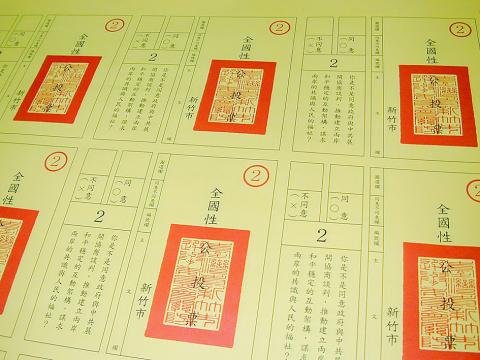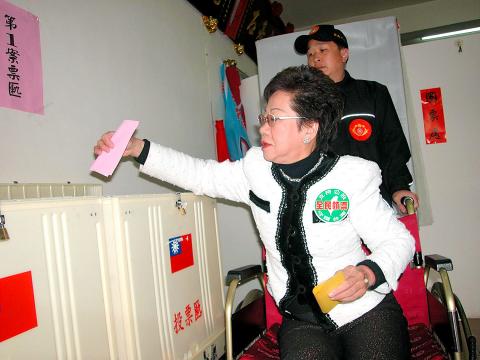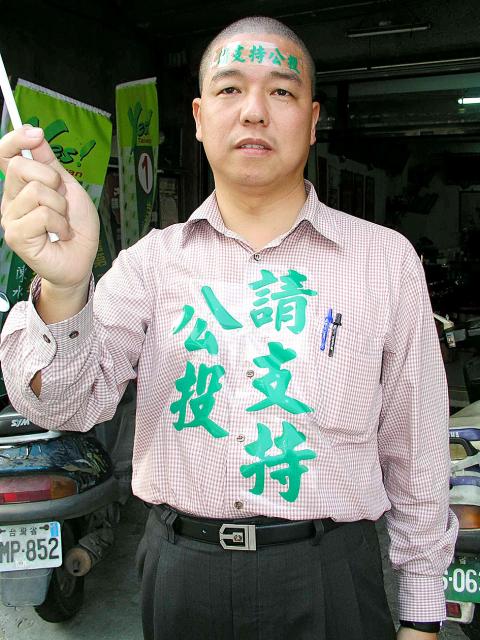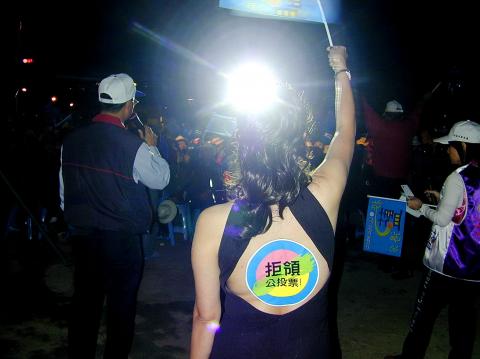Dec. 3 to Dec. 9
Under today’s relaxed rules, the two questions in Taiwan’s first national referendum in March 2004 would have passed overwhelmingly. The referendum came at a sensitive time, with then-president Chen Shui-bian (陳水扁) running for reelection and Beijing watching closely.
The two questions were:

Photo: Chen Wei-jen, Taipei Times
“The People of Taiwan demand that the Taiwan Strait issue be resolved through peaceful means. Should Mainland China refuse to withdraw the missiles it has targeted at Taiwan and to openly renounce the use of force against us, would you agree that the Government should acquire more advanced anti-missile weapons to strengthen Taiwan’s self-defense capabilities?”
“Would you agree that our Government should engage in negotiation with Mainland China on the establishment of a ‘peace and stability’ framework for cross-strait interactions in order to build consensus and for the welfare of the peoples on both sides?”
Over 90 percent of the roughly 7 million votes were in favor of both questions. However, a voter turnout of 50 percent was required back then for a referendum to pass. Both questions fell just short at just over 45 percent.

Photo: Hsu Hui-ling, Taipei Times
The questions were toned-down versions of Chen’s earlier rhetoric demanding that China immediately withdraw all ballistic missiles aimed at Taiwan and openly renounce the use of force.
The US was pleased with the revised questions but “stopped short of explicitly endorsing the new phrasing... which [was] still likely to upset the Chinese,” reported the New York Times.
Chen, then-chairman of the Democratic Progressive Party (DPP), was also dealing with domestic pressures. His opponents had been opposed to the referendums since the DPP introduced the first draft of the Referendum Act in July 2003.

Photo: Chang Hsieh-sheng, Taipei Times
CAUGHT IN A BIRDCAGE
National referendums are a relatively modern invention. There were only 73 recorded national referendums before 1900, with none in Asia. Only 12 countries provided for national referendums until the 1940s, when the number began to grow steadily before shooting up in the 1990s.
As early as 1947, in the aftermath of the 228 Incident — an anti-government uprising that was brutally suppressed — writer and businessman Chiu Yung-han (邱永漢) petitioned the UN to allow Taiwanese to decide the future of Taiwan through a national referendum. This did not happen due to the Chinese Nationalist Party’s (KMT) authoritarian rule and Chiang Kai-shek’s (蔣介石) insistence that Taiwan was a part of China.

Photo: Chen Wei-jen, Taipei Times
Between 1990 and 2003, 16 local referendums were held, but none at the national level.
In the years leading up to the Referendum Act, Chen mentioned national referendums several times — first, with reference to the future of the Fourth Nuclear Power Plant; then in 2002, in support of legislation authorizing a referendum to declare Taiwanese independence. Lawmakers began to draft a bill in March 2003, but the DPP was not happy with the version that Chen’s cabinet approved, which excluded referendums on independence and national security.
Chen again called for a national referendum in May 2003 after Taiwan’s failed bid to join the WHO, but it did not take place because there was no legislation. By July, the DPP unveiled a draft bill that would authorize the president to initiate a referendum on “issues pertinent to national security if Taiwan were threatened by foreign powers such that its sovereignty could be altered.” This came to be known as the “defensive” referendum clause.
The KMT and People First Party (PFP), which together dominated the legislature, were strongly opposed to the bill and ended up proposing their own draft.
The final “watered-down” bill made it almost impossible to hold referendums for independence or constitutional changes, and banned referendums to draft a new constitution. The bar was set so high that the bill came to be dubbed the “birdcage” referendum act. This was still a common term when thresholds were relaxed last December.
‘PEACE’ REFERENDUM
Nevertheless, the “defensive” referendum clause was kept in the final bill. Chen would invoke this clause, saying that China’s missiles aimed at Taiwan constituted a national security threat. Critics, including the White House, maintained that he was using the referendum to further his bid for reelection the following year. Unsurprisingly, Beijing was furious, and the US warned Chen to keep his rhetoric in check.
After several delays, Chen announced the final questions on Jan. 17, 2004 and set the date for the presidential elections on March 20. A series of 10 debates between major politicians were held between Feb. 29 and March 14.
Chen’s pan-blue opponents were actually in favor of the referendum proposals, but then-KMT chairman Lien Chan (連戰), declared the concept of referendums “illegal and meaningless” and urged supporters not to vote, hoping that the referendum would fall below the 50 percent voter turnout threshold.
Lien summed up his position during the second presidential election debate on Feb. 21, 2004, saying, “I respect the people’s right to vote on the referendum, but for me, it is an illegal and controversial referendum. I certainly won’t cast my vote on it and I suggest Mr Chen immediately stop it.”
This became a contentious battle leading up to the elections. Supporters from both camps showed their stances through stickers, signs, slogans and demonstrations. People attended rallies sporting “Refuse to take the referendum ballot” stickers, while others wore pins that read “Support the national referendums and protect Taiwan.”
The referendums failed, showing that it was possible to derail the vote through a boycott. Due to similarly high thresholds for people to submit petitions for referendums, subsequent questions were party-sponsored, including two questions on transitional justice during the 2008 legislative elections and two on UN membership during the 2008 presidential elections.
None of the first six referendum questions managed to pass the voter turnout threshold. Ultimately, this led to amendments to the Referendum Act last December, which lowered the legal voting age, slashed thresholds for initiating, seconding and passing referendums.
Taiwan in Time, a column about Taiwan’s history that is published every Sunday, spotlights important or interesting events around the nation that have anniversaries this week.

Towering high above Taiwan’s capital city at 508 meters, Taipei 101 dominates the skyline. The earthquake-proof skyscraper of steel and glass has captured the imagination of professional rock climber Alex Honnold for more than a decade. Tomorrow morning, he will climb it in his signature free solo style — without ropes or protective equipment. And Netflix will broadcast it — live. The event’s announcement has drawn both excitement and trepidation, as well as some concerns over the ethical implications of attempting such a high-risk endeavor on live broadcast. Many have questioned Honnold’s desire to continues his free-solo climbs now that he’s a

As Taiwan’s second most populous city, Taichung looms large in the electoral map. Taiwanese political commentators describe it — along with neighboring Changhua County — as Taiwan’s “swing states” (搖擺州), which is a curious direct borrowing from American election terminology. In the early post-Martial Law era, Taichung was referred to as a “desert of democracy” because while the Democratic Progressive Party (DPP) was winning elections in the north and south, Taichung remained staunchly loyal to the Chinese Nationalist Party (KMT). That changed over time, but in both Changhua and Taichung, the DPP still suffers from a “one-term curse,” with the

Lines between cop and criminal get murky in Joe Carnahan’s The Rip, a crime thriller set across one foggy Miami night, starring Matt Damon and Ben Affleck. Damon and Affleck, of course, are so closely associated with Boston — most recently they produced the 2024 heist movie The Instigators there — that a detour to South Florida puts them, a little awkwardly, in an entirely different movie landscape. This is Miami Vice territory or Elmore Leonard Land, not Southie or The Town. In The Rip, they play Miami narcotics officers who come upon a cartel stash house that Lt. Dane Dumars (Damon)

Jan. 26 to Feb. 1 Nearly 90 years after it was last recorded, the Basay language was taught in a classroom for the first time in September last year. Over the following three months, students learned its sounds along with the customs and folktales of the Ketagalan people, who once spoke it across northern Taiwan. Although each Ketagalan settlement had its own language, Basay functioned as a common trade language. By the late 19th century, it had largely fallen out of daily use as speakers shifted to Hoklo (commonly known as Taiwanese), surviving only in fragments remembered by the elderly. In